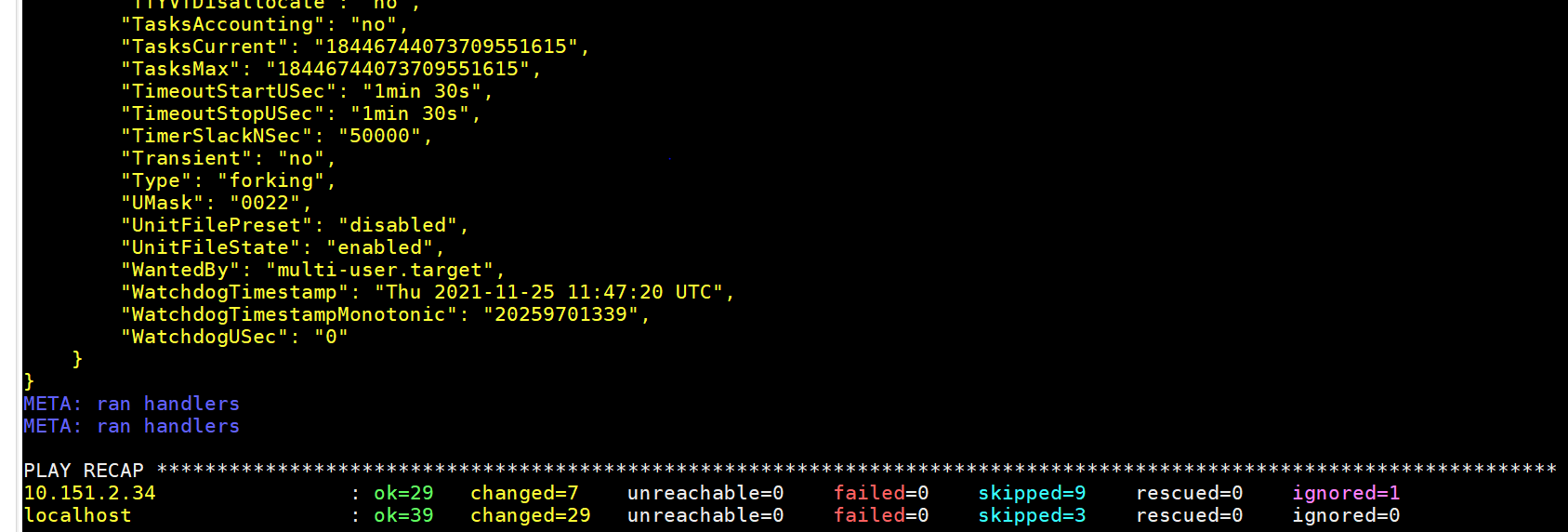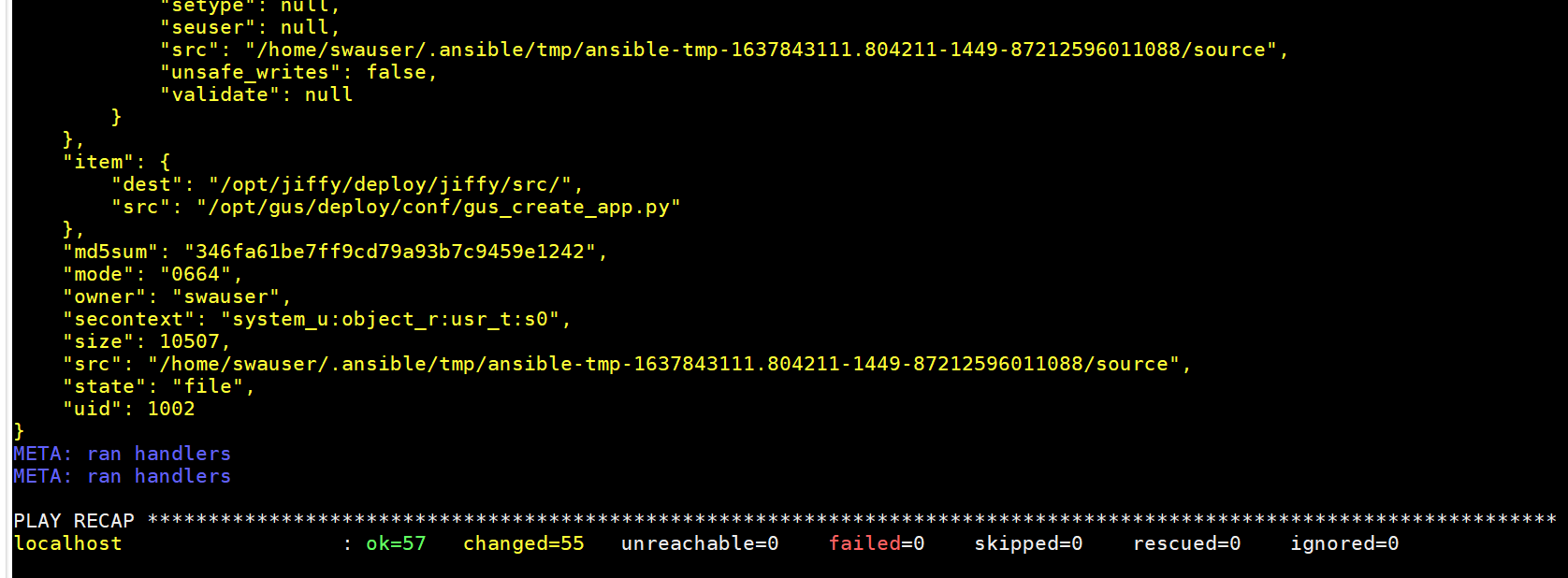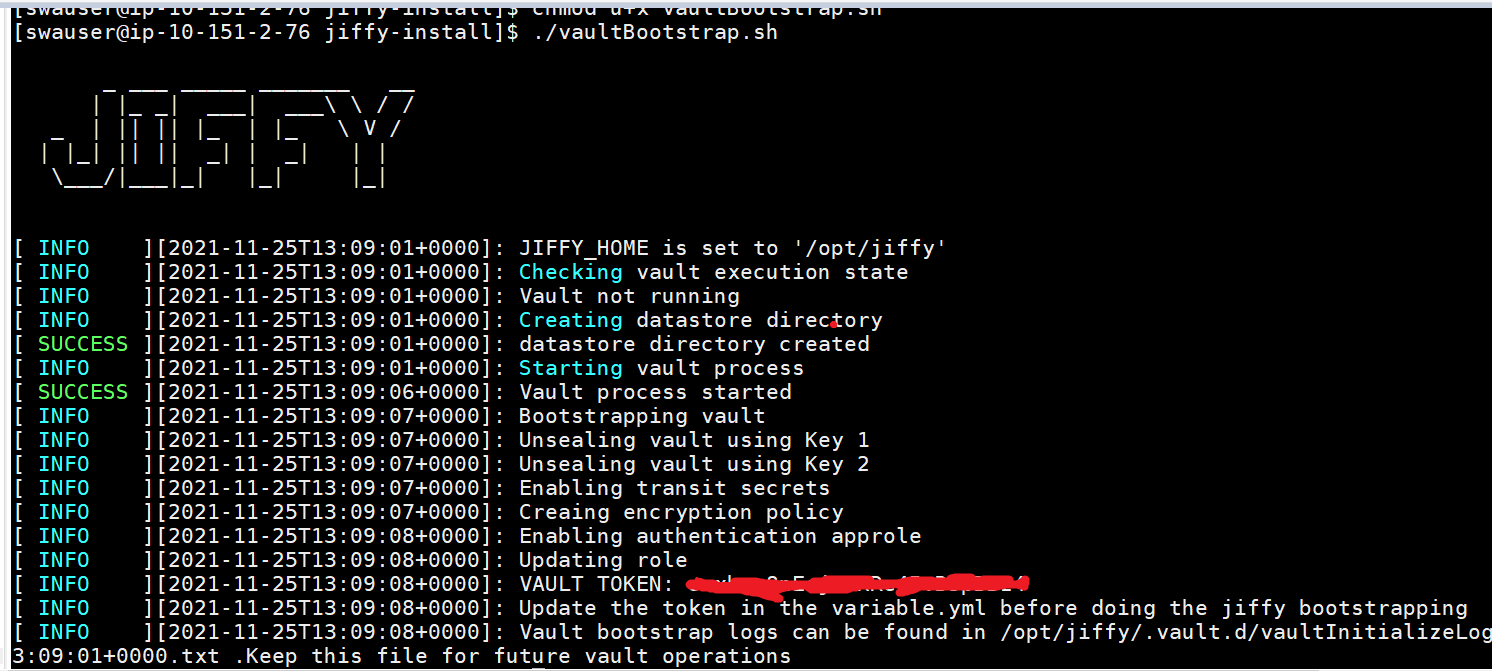
Jiffy Installation
Last Updated: Sep 2, 2022

Last Updated: Sep 2, 2022
| Name | Version | Type | Description |
|---|---|---|---|
| jiffy-playbook.tar.gz | 4.8 | Ansible playbook | Ansible scripts which does the upgrade |
| jiffy-installation.tar.gz | 4.8 | Compressed tar | Jiffy core artifacts |
| jiffy-helms-v.4.8s.zip | 4.8 | Helm charts | Helm charts for container deployments |
| Container | Tags (4.8) |
|---|---|
| backward-comp | JARVIS-MAIN-BackwardCompatibilityEngine7122Jun22 |
| bolcategory | JARVIS-MAIN-vendorcategorisation_14226Jul22 |
| bolml | JARVIS-MAIN-T4.3.020626Jul22 |
| docsplit | JARVIS-MAIN-DocumentSplit_7322Jun22 |
| functionator | JARVIS-MAIN-263 |
| handwritingsegmentation | JARVIS-MAIN-HWSegmentation_14719Jul22 |
| invoicecategory | JARVIS-MAIN-T4.3.020626Jul22 |
| invoiceml | JARVIS-MAIN-T4.3.020626Jul22 |
| pdf2image | JARVIS-MAIN-Pdf2Image_8422Jun22 |
| pdf2json-service | JARVIS-MAIN-Pdf2JsonService_12521Jul22 |
| pdfsplit | JARVIS-MAIN-Pdfsplit_7622Jun22 |
| portfolio | JARVIS-MAIN-Portfolio_36828Jul22 |
| template-converter | JARVIS-MAIN-251 |
| w2ml | JARVIS-MAIN-w2ml_9922Jun22 |
| w2split | JARVIS-MAIN-W2Split_11122Jun22 |
| lineitemmatch | JARVIS-MAIN-LineItemMatch_8222Jun22 |
No changes are made to the helm charts after release 4.6.
| Component | Port | Process | Source | Destination |
|---|---|---|---|---|
| Email Server (TCP Ports) | 25 | SMTP Server | Core Application Server | |
| Email Server | 993 | IMAP/IMAPS | Core Application Server | |
| Jiffy Web | 443 | Nginx | Any windows machine where the user accesses Jiffy application | Core Application Server |
| JPipe gRPC | 443 | Nginx | All the windows client machines where BOT is installed | Core Application Server |
| RabbitMQ Viewer | 15672 | RabbitMQ | Any windows machine where the user accesses RabbitMQ web page | Core Application Server |
| MongoDB | 27017 | MongoDB | Core Application Server | Database Server |
| Postgres | 5432 | Postgres | Core Application Server | Database Server |
| Kubernetes Server | 443 | Nginx Ingress | Core Application Server | Kubernetes Server |
| LDAP Server | 389 | LDAP | Core application server | LDAP Server |
Click here to view the detailed list of Yum packages and their respective versions.
Access to the repositories mentioned in the following table via the Internet or a proxy.
Recommended Repositories
| Additional Repositories to be Enabled Specific to Redhat | Additional Repositories to be Enabled Specific to Centos |
|---|---|
| rhel-7-server-rpms | centos-release-scl |
| rhel-7-server-extras-rpms | |
| rhel-7-server-optional-rpms | |
| rhel-server-rhscl-7-rpms | |
| rhel-7-server-devtools-rpms |
For RHEL:
| Package name | Version |
|---|---|
| llvm-toolset-7-clang | 5.0.1-4 |
| postgresql-devel | 14.2 |
To install llvm-toolset-7-clang, use the following steps.
- subscription-manager repos --enable rhel-7-server-devtools-rpms
- subscription-manager repos --enable rhel-server-rhscl-7-rpms
- cd /etc/pki/rpm-gpg
- wget -O RPM-GPG-KEY-redhat-devel https://www.redhat.com/security/data/a5787476.txt
- rpm --import RPM-GPG-KEY-redhat-devel
- yum install http://mirror.centos.org/centos/7/os/x86_64/Packages/libedit-devel-3.0-12.20121213cvs.el7.x86_64.rpm
- yum install llvm5.0-devel
- yum install llvm-toolset-7-clang -y
- $ curl -fsSL -o get_helm.sh https://raw.githubusercontent.com/helm/helm/main/scripts/get-helm-3
- $ chmod 700 get_helm.sh
- $ ./get_helm.sh
Download helm charts from downloads.jiffy.ai into in /tmp/jiffy4.8.0/helm(can be performed by any valid Linux user).
- export RELEASE_VERSION=4.8
- mkdir -p /tmp/jiffy-install/$RELEASE_VERSION/
- cd /tmp/jiffy-install/$RELEASE_VERSION/
- wget –user {username} –ask-password downloads.jiffy.ai/4.8/Release/jiffy-helms-v4.8.zip
unzip jiffy-helms-v4.8.zip
Download and extract Artifacts to /tmp/jiffy-install/$RELEASE_VERSION/(can be performed by any valid Linux user).
- cd /tmp/jiffy-install/$RELEASE_VERSION/
- wget –user {username} –ask-password downloads.jiffy.ai/4.8/Release/jiffy-installation.tar.gz
- wget –user {username} –ask-password downloads.jiffy.ai/4.8/Release/jiffy-playbook.tar.gz
- tar -xf jiffy-playbook.tar.gz>
Contact support@jiffy.ai for the login credentials to download artifacts.
Extract the ansible-playbook tar file in the core server (tar -xf jiffy-playbook.tar.gz). The extracted files include the inventory and variable.yml.
Inventory file has to be filled as per the user environment(contains all the details of the servers and authentication methods)).
Variables file has to be filled as per the user environment(contains all the parameters, such as, username, configurable values, mountpoint, etc.).
- export RELEASE_VERSION=4.8
- cd /tmp/jiffy-install/$RELEASE_VERSION/
- kubectl create namespace jiffy-cognitive
- kubectl apply -f imagepull-creds.yml -n jiffy-cognitive
- create classic load balancer
- Update certificate arn in the controller service
- service.beta.kubernetes.io/aws-load-balancer-ssl-cert:
- Applicable for AWS EKS Users
- kubectl apply -f ingress-nginx.yaml
- For installing opendistro elastic search and kibana
- Update opendistro-es/values.yml with hostname values
- Line no 94 and 436
- helm install opendistro opendistro-es -n jiffy-cognitive
- For installing fluentd daemonset
- helm install fluentd fluentd -n jiffy-cognitive
Install ansible and dependent yum packages in the core server.
- export RELEASE_VERSION=4.8
- cd /tmp/jiffy-install/$RELEASE_VERSION/
- chmod u+x preAnsibleSetup.sh
- ./preAnsibleSetup.sh
Wait for the setup to complete.

- source /opt/jiffy3rdparty/ansibleEnv/bin/activate
- ansible-playbook root.yml -i inventory -e @variable.yml
- For debug mode:
- ansible-playbook root.yml -i inventory -e @variable.yml -v
- For detailed debug mode:
- ansible-playbook root.yml -i inventory -e @variable.yml -vvvv
- For sudo and ssh password prompt add -kK options along with run command:
- ansible-playbook root.yml -i inventory -e @variable.yml -kK
Wait for the setup to complete.

chown -R {jiffyapp linux user}:{jiffyapp linux user} /tmp/{jiffy-install}
- export RELEASE_VERSION =4.8
- cd /tmp/jiffy-install/$RELEASE_VERSION/
- source /opt/jiffy3rdparty/ansibleEnv/bin/activate
- ansible-playbook non-root.yml -i inventory -e @variable.yml
- For debug mode:
- ansible-playbook non-root.yml -i inventory -e @variable.yml -v
- For detailed debug mode:
- ansible-playbook non-root.yml -i inventory -e @variable.yml -vvvv
Wait for the setup to complete.


- Grant execute permission and execute vaultBootstrap.sh
- source ~/.bashrc
- chmod u+x vaultBootstrap.sh
- ./vaultBootstrap.sh

- with masterkey prompt:
- ansible-playbook jiffybootstrap.yml -e @variable.yml
- without masterkey prompt:
- ansible-playbook jiffybootstrap.yml -e masterKey=‘{replaceme}’ -e @variable.yml
- export clusterDNS=“{clusterDNS}”
- chmod 777 k8s-deployment.sh
- Create jiffy-auth secrets
- kubectl create secret generic jiffy-auth –from-literal=password_key=‘{masterkey}’ –from-file={mountpoint}/jiffy/auth/.at -n jiffy-cognitive
Default values for the Kubernetes-upgrade script.
- namespace(n)=jiffy-cognitive
- replicacount(r)=1
- mountpoint(m)=/opt
./k8s-deployment.sh -k '{masterkey|mandatory}' -n {namespace} -c {clusterDNS|mandatory} -r {replicacount} -m {mountpoint}
(Use only in non-prod environments as a temporary measure if valid SSLs are not available.)
To Generate SSL Certificate for DB Instance and Cognitive Instance:
- export RELEASE_VERSION=4.8
- cd /tmp/jiffy-install/$RELEASE_VERSION/
- chmod +x generate-db-cert.sh
- ./generate-db-cert.sh -d {DBInstanceDomainname}
Localhost certificates for the core server are generated by ansible and are available under /tmp/jiffy-install/$RELEASE_VERSION/